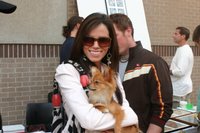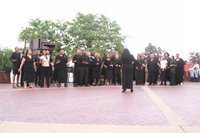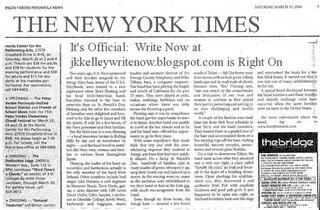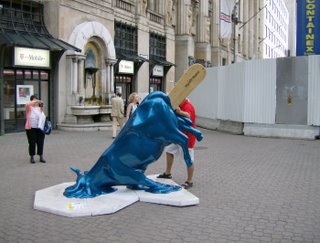




 Welcome! I am an American writer and high school teacher. Please comment and share, as you wish.
Welcome! I am an American writer and high school teacher. Please comment and share, as you wish.
 My parents emailed us with the announcement: They had planned a tour of their six children to celebrate their 45th wedding anniversary. This trip would take them a few miles across town, hundreds of miles across the prairie, to Northern Indiana, the East Coast, and the
My parents emailed us with the announcement: They had planned a tour of their six children to celebrate their 45th wedding anniversary. This trip would take them a few miles across town, hundreds of miles across the prairie, to Northern Indiana, the East Coast, and the I met them in
I was a sixteen-year-old
So the selection of Russian restaurant to honor my parents’ 45th anniversary was no accident. They gave me
We started with a flight of vodkas—bilberry, cranberry, and plain. These vodkas, served with dark rye bread chunks and pickles, go down like velvet. A fine way to start any long, long lunch.
We decided to share a sampler meal because we couldn’t decide between all the delicious options. Borscht (served hot, the traditional way), beet caviar, stuffed mushrooms. Followed by stuffed cabbage, Moldavian chicken meatballs, a breaded chicken delight, beef stroganoff, kashi and rice.
The finish must be handled with care. We managed it properly by drinking endless cups of deep amber Russian tea (available for sale on their website) and a selection of strudels, cookies, and cakes.
A hearty almost three-hour celebration.
The restaurant is located a few steps from the Art Institute, but the day was too mild to ruin by going indoors. So we headed to the
It was a brief world wind visit. I hope they do the same for their 46th anniversary!
 Welcome! I am an American writer and high school teacher. Please comment and share, as you wish.
Welcome! I am an American writer and high school teacher. Please comment and share, as you wish.
Marcel Duchamp (1887-1968)
While the name Duchamp may not ring a bell, you have surely seen or heard about one or two of his works. For example, he is the artist that painted a jaunty mustache on a postcard reproduction of the Mona Lisa (1919). He also submitted, under the same R. Mutt, an inverted urinal to an art show (1917). Although the urinal was rejected from the show, it has become a legendary anti-sculpture.
I came to admire Duchamp’s self-described title as “respirateur” after reading Duchamp: A Biography by Calvine Tomkins. He was a man who lived his life by his own rules, unafraid to fly in the face of a conventional life and all its creature comforts. He breathed and he created things. In a world suffused with material objects, he transformed the mundane into art by making his “readymades.” He took a regular snow shovel, inscribed a cryptic title, signed it and it was art. Or was it? His art went beyond the visual and material elements associated with art and made his audience think and ask the question: what is art? (What would Duchamp have said about the CowParade?)
Duchamp inspired young artists to think freely, think boldly about both art and life. Some criticized Duchamp for all the bad art that sallied forth in the late twentieth century. And there has been some regrettable artwork. And yet I have to say that Duchamp has inspired me in a positive way. It is my job to be a “respirateur.” For too long I have been enslaved by doctrinal dictates and good-girl standards that compel me to observe and serve the world. Being a good-girl perfectionist, the observe-and-serve mandate dictates when it should merely guide.
First, one must breathe and then one can observe and just observe. Only then can I witness to what I see. Witness by my writing. By my art. And finally by my actions.
Duchamp taught me that it is okay to merely observe the world. In fact, it may be the finest act of humility there is. Of course, to accurately observe the world—to see truthfully what there is and what there should be—is enough for a lifetime. Practically, his life and art have also given me permission to write my novel by my own rules.

 Welcome! I am an American writer and high school teacher. Please comment and share, as you wish.
Welcome! I am an American writer and high school teacher. Please comment and share, as you wish.
 Welcome! I am an American writer and high school teacher. Please comment and share, as you wish.
Welcome! I am an American writer and high school teacher. Please comment and share, as you wish.

 Welcome! I am an American writer and high school teacher. Please comment and share, as you wish.
Welcome! I am an American writer and high school teacher. Please comment and share, as you wish.
 Welcome! I am an American writer and high school teacher. Please comment and share, as you wish.
Welcome! I am an American writer and high school teacher. Please comment and share, as you wish.

And so I decided to instead write about cows.
Another Update: I found the official Hungarian site for the CowParade. Check it out and dust off your Hungarian language skills! http://www.cowparade.hu/index2.html
 Welcome! I am an American writer and high school teacher. Please comment and share, as you wish.
Welcome! I am an American writer and high school teacher. Please comment and share, as you wish.
One Hour to Madness and Joy
by Walt Whitman
One hour to madness and joy! O furious! O confine me not!
(What is this that frees me so in storms?
What do my shouts amid lightnings and raging winds mean?)
O to drink the mystic deliria deeper than any other man!
O savage and tender achings! (I bequeath them to you my children,
I tell them to you, for reasons, O bridegroom and bride.)
O to be yielded to you whoever you are, and you to be yielded to me
in defiance of the world!
O to return to
O to draw you to me, to plant on you for the first time the lips of
a determin'd man.
O the puzzle, the thrice-tied knot, the deep and dark pool, all
untied and illumin'd!
O to speed where there is space enough and air enough at last!
To be absolv'd from previous ties and conventions, I from mine and
you from yours!
To find a new unthought-of nonchalance with the best of Nature!
To have the gag remov'd from one's mouth!
To have the feeling to-day or any day I am sufficient as I am.
O something unprov'd! something in a trance!
To escape utterly from others' anchors and holds!
To drive free! to love free! to dash reckless and dangerous!
To court destruction with taunts, with invitations!
To ascend, to leap to the heavens of the love indicated to me!
To rise thither with my inebriate soul!
To be lost if it must be so!
To feed the remainder of life with one hour of fulness and freedom!
With one brief hour of madness and joy.
 Welcome! I am an American writer and high school teacher. Please comment and share, as you wish.
Welcome! I am an American writer and high school teacher. Please comment and share, as you wish.
August Morning It's ripe, the melon
 Welcome! I am an American writer and high school teacher. Please comment and share, as you wish.
Welcome! I am an American writer and high school teacher. Please comment and share, as you wish.
My parents arrived in
It is a long, long trip from
Saturday and Sunday were spent on the pot-holed roads between villages and bigger cities in Transylvania. We visited a region famous for its salt mines, partially because my hometown in
The mines we visited were huge caverns used here for health and recreation. It is considered therapeutic for those with respiratory problems to spend hours down inside the mines breathing the air which is certainly pollen free. None of us noticed an air ventilation system. No fire escapes. After the 1.5 kilometer bus ride down into the mine, we descended about 200 wooden steps. The experience was eerie. The mine is now equipped with picnic tables, swings, ping pong tables, and room for badminton. There is a church and a museum. And, of course, a coffee bar. (Other parts of the mine are still in working condition.)
After leaving the mines we spent the afternoon in nearby Szovata, a resort town with a salty-water lake. The lake is filled with bobbing heads due to the buoyancy of the water. We didn't float ourselves; instead we enjoyed a long, long lunch on a patio near the lake.
We fed my parents all the local foods we love: cheeses, cakes, fresh fruits and vegetables, mushrooms taken down from the mountains, micc (a kind of grilled meat), kurtos kalach, etc.
We took them up into the mountains around Csik to look at land we might want to buy. We drank Csiki beer on the main street and people watched. (We kept the gypsies at arm's length.)
On Monday we visited the church at Csiksomlyo, famous for its miraculous Virgin Mary statue.
We ate Grandma’s lunch at 1 pm everyday—roka mushrooms paprikas or chicken paprikas, puliszka, or potatoes, or perhaps sheep’s milk cheese and always enough perfectly ripe watermelon to feed an army.
Thanks be to God, the heat wave broke before we arrived in
 Welcome! I am an American writer and high school teacher. Please comment and share, as you wish.
Welcome! I am an American writer and high school teacher. Please comment and share, as you wish.